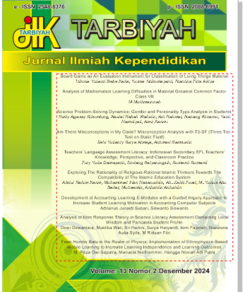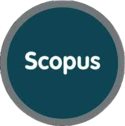Science Problem-Solving Dynamics: Gender and Personality Type Analysis in Students
DOI:
https://doi.org/10.18592/tarbiyah.v13i2.13513Keywords:
gender, personality types, science problem solvingAbstract
This study examines how problem-solving patterns in science among 9th-grade students correlate with different personality types based on Keirsey's classification: Idealist, Artisan, Guardian, and Rational. It employs the Investigation of Lived Experience methodology in Cognitive Psychology to delve into the internal experiences of 36 students from SMP Negeri 5 Bandung. The research explores gender distribution, school representation, and the prevalence of each personality type among the participants. Data collection methods include adapted questionnaires, written tests on earth and space science concepts, and follow-up interviews. These instruments are analyzed using the fixed comparison method to identify and understand distinct problem-solving tendencies associated with each personality type. Specifically, Idealists are found to prioritize understanding, Artisans employ intuitive-analogical approaches, Guardians rely on intuitive hypotheses, and rationalists utilize analogical reasoning. Overall, this study provides detailed insights into how personality types influence problem-solving strategies in science education. It suggests implications for personalized educational approaches tailored to individual student preferences and tendencies, aiming to enhance learning outcomes in 9th-grade science classrooms.References
Agustin, M. D. A. (2018). Proses Berfikir Matematis Siswa Dalam Memecahkan Masalah Matematika Ditinjau Dari Tipe Kepribadian Keirsey. Madrosatuna: Journal of Islamic Elementary School, 2(2), 29-38. https://doi.org/10.21070/madrosatuna.v2i2.1967
Agustina, L., & Galatea, C. (2024). Logical Thinking in Idealist and Rational Students. Journal of Education and Learning Mathematics Research (JELMaR), 5(1), 42-54. https://doi.org/10.37303/jelmar.v5i1.141
Alfathy, R., Astuti, B., Linuwih, S. (2018). Identification of Problem-Solving Pattern of Physics Based on Students Personality. Variable, 1(2), 42-50. http://dx.doi.org/10.26737/var.v1i2.690
Alfathy, R., Astuti, B., Linuwih, S. (2019). The Profile of Physical Problem-Solving Based on Student’s Personality Types. Physics Communication, 3(1), 21-28. https://doi.org/10.15294/physcomm.v3i1.15258
Anderson, J. (2009). Mathematics Curriculum Development and the Role of Problem Solving. Discussion Paper, ACSA National Conference on October 2009..
Brown, M. J. (2012). John Dewey’s Logic of Science. HOPOS: The Journal of the International Society for the History of Philosophy of Science, 2(2), 258-306.
Central Board of Secondary Education (CBSE). (2020). 21st Century Skills (A Handbook). Delhi: India.
Creswell, J. W., & Clark, V. L. P. (2018). Designing and conducting mixed methods research (3rd ed.). Thousand Oaks, CA: SAGE.
Darling-Hammond, L., Flook, L., Cook-Harvey, C., Barron, B., & Osher, D. (2020). Implications For Educational Practice of The Science of Learning and Development. Applied Developmental Science, 24(2), 97-140.
Dewiyani, M. J. S., & Sagirani, T. (2014). Inculcation Method of Character Education Based on Personality Types Classification in Realizing Indonesia Golden Generation. International Journal of Evaluation and Research in Education (IJERE), 3(2), 91-98. http://dx.doi.org/10.11591/ijere.v3i2.4199
Echavarri, M., Godoy, J.C., Olaz, F. (2007). Gender Differences in Cognitive Skills and Academic Performance in College Students. Univ. Psychol, 6(2), 319–329.
Embarak, O., Khan, Z., & Gurung, B. (2019). Understanding Students Personality to Detect Their Learning Differences. Lecture Notes on Data Engineering and Communications Technologies, 29(February), 383–390. https://doi.org/10.1007/978-3-030-12839-5_35
Fitroh, U. N., Rusilowati, A., Darsono, T., Marwoto, P., & Mindyarto, B. N. (2020). Analysis of Student Problem Solving Skills in Harmonic Motion Materials. Physics Communication, 4(2), 25–31. https://journal.unnes.ac.id/nju/index.php/pc/article/view/31174
Fourie, M., & Schlebusch, G. (2023). A Cognitive Stance to Enhance Learner Information Processing Ability in the Classroom: Structural Equation Modelling Approach. Journal of Advocacy, Research and Education, 10(1), 18–31. https://doi.org/10.13187/jare.2023.1.18
Gall, M. D., Gall, J. P., & Borg, W. R. (2003). Educational Research: An Introduction (7th ed.). Boston: Allyn & Bacon.
Ginevra, M. C., Nota, L., Heppner, P. P., Heppner, M., & Soresi, S. (2015). The Relationship of Personality Type, Problem-Solving Appraisal, and Learning Strategies. Journal of Career Assessment, 23(4), 545–558. https://doi.org/10.1177/1069072714553075
Grimm, J., & Richter, T. (2024). Rational thinking as a general cognitive ability: Factorial structure, underlying cognitive processes, and relevance for university academic success. Learning and Individual Differences, 111(March). https://doi.org/10.1016/j.lindif.2024.102428
Güner, P. & Erbay, H. N. (2021). Metacognitive Skills and Problem-Solving. International Journal of Research in Education and Science (IJRES), 7(3), 715-734.
Hoesny, M. U., & Darmayanti, R. (2021). Permasalahan dan Solusi untuk Meningkatkan Kompetensi dan Kualitas Guru: Sebuah Kajian Pustaka. Scholaria: Jurnal Pendidikan dan Kebudayaan, 11(2), 123-132.
Jackson, J. J. (2011). The Effects of Educational Experiences on Personality Trait Development. Disertation. Urbana, United State: Univerity of Illinois.
Keirsey, D. (1998). Please Understand Me II: Temperament, Character, Intelligence. United States: Prometheus Nemesis Books.
Keirsey, D., & Bates. (1984). Please Understand Me. California: Promotheus Nemesis Book Company.
Kipman, U., Bartholdy, S., Weiss, M., Aichhorn, W., & Schiepek, G. (2022). Personality traits and complex problem solving: Personality disorders and their effects on complex problem-solving ability. Frontiers in psychology, 13, 788402. https://doi.org/10.3389/fpsyg.2022.788402
Kiraga, F. (2023). a Study of Problem Solving in Physics Learning: a Systematic Review. EduFisika: Jurnal Pendidikan Fisika, 8(3), 303–315. https://doi.org/10.59052/edufisika.v8i3.29446
Kokkinos, C. M., Antoniadou, N., & Voulgaridou, I. (2024). Majors unleashed: Unravelling students’ personality profiles across academic disciplines. Current Psychology, 43, 17635–17645. https://doi.org/10.1007/s12144-024-05721-2
Kusumah, R. G. T., Sasongko, R. N., Kristiawan, M., Walid, A., & Andaria, M. (2021). Assessment to Measure Problem Solving Ability in the Lesson of the Interaction of Living Things with the Environment. Jurnal Studi Guru dan Pembelajaran, 4(1), 147-155.
Manuaba, I. B. A. P., No, Y., & Wu, C. C. (2022) The Effectiveness of Problem Based Learning in Improving Critical Thinking, Problem-Solving and Self-Directed Learning in First-Year Medical Students: A Meta-analysis. PLoS ONE, 17(11): e0277339, 1-12.
Mardhiyatirrahmah, L., & Abdussakir. (2021). Restructuring of students’ thinking in junior high school through defragmentation for solving mathematical problems. Tarbiyah: Jurnal Ilmiah Kependidikan, 10(2), 95-102. http://dx.doi.org/10.18592/tarbiyah.v10i2.4810
Mateus, C., Campis, R., Aguaded, I., Parody, A., & Ruiz, F. (2021). Analysis of Personality Traits and Academic Performance in Higher Education at A Colombian University. Heliyon, 7, 1-7.
Mawaddah, A., Anwar., Yusrizal., & Zubainur, C. M. (2021). The Impact of Students' Personality Types On The Application of Problem-Solving Strategies In Solving PISA Questions. Journal of Physics: Conference Series, 1882(012062), 1-9.
Moleong, L. (2002). Metode Penelitian Kualitatif. Bandung: CV. Remaja.
Molnár, G., & Csapó, B. (2018) The Efficacy and Development of Students’ Problem-Solving Strategies During Compulsory Schooling: Logfile Analyses. Front. Psychol. 9(302), 1-17.
Mulyasa. (2008). Menjadi Guru Profesional Menciptakan Pembelajaran Kreatif dan Menyenangkan. Bandung: PT. Remaja Rosdakarya.
Nupus, Y., Heryani, Y., & Rustina, R. (2024). Kemampuan Spasial Ditinjau dari Tipe Kepribadian David Keirsey. Indiktika: Jurnal Inovasi Pendidikan Matematika, 6(2), 136-150. https://doi.org/10.31851/indiktika.v6i2.15166
Octavia, S. C., Sihombing, R. A., Destine, K. T., & Hutagalung, J. F. (2022). Analysis of Obstacles on Limited Face-To-Face Learning During the Covid-19 Pandemic Junior High School in Medan. Tarbiyah: Jurnal Ilmiah Kependidikan, 11(1), 18-28.
Octor, J. L., Strand, N. E., Mestre, J. P. & Ross, B. H. (2015). Conceptual Problem Solving in High School Physics. Physical Review Special Topics-Physics Education Research, 11(2), 1-13.
Olson, M. H., & Hergenhahn, B. R. (2013). An Introduction to Theories of Personality, Ed: 8. Terjemahan: Yudi Santoro. Yogyakarta: Pustaka Pelajar
Panggabean, F. T. M., Simanjuntak, L. A., Sihombing, R. A., Octavia, S. C., & Tambunan, J. (2023). Analysis of 7th-grade Students' Misconceptions of Acid-Base. J-PEK (Jurnal Pembelajaran Kimia), 8(1), 1-7.
Panjaitan, B. (2015). Karakteristik Metakognisi Siswa dalam Memecahkan Masalah matematika Berdasarkan Tipe Kepribadian. Jurnal Ilmu Pendidikan, 21(1), 19-28.
Pertiwi, A. D., Masrukan & Susilo. (2014). Analisis Kemampuan Komunikasi Matematis Melalui Pembelajaran Model 4K Berdasarkan Tipe Kepribadian Peserta Didik Kelas VII. Jurnal Kreano, 5(2), 195-204.
Sebastian, M. A. (2017). Students’ Gender, Learning Style, and Difficulties in Solving Problems in College Algebra. International Journal of Multidisciplinary Research and Modern Education, 3(2), 87-95.
Sepriyanti, N., Trinova, Z., Susanto, A., & Mahmuda, R. (2020). The application of the Polya's steps reviewed from problem-solving ability in two-variable linear equation system (SPLDV). Tarbiyah: Jurnal Ilmiah Kependidikan, 9(1), 51-65. http://dx.doi.org/10.18592/tarbiyah.v9i1.3543
Shelton, T. C. (2018). Student Temperament Assessment and Its Relationship with The Selection of Accounting as A Major. Disertation. Blacksburg: Virginia Polytechnic Institute and State University.
Sihombing, R. A., & Hasruddin. (2024). Development of Science, Technology, Engineering, and Mathematics (STEM)-Based E-Book on Human Digestive System Material Based on Scientific Literacy. Jurnal Pendidikan Matematika dan IPA, 15(2), 182-197.
Sihombing, R. A., Manurung, G. A., & Simanjuntak, L. A. (2021). Analysis of Implementation of TPACK by Teachers Through Distance Learning at Junior High School in Medan. Indonesian Science Education Research (ISER), 3(2), 1-11.
Sihombing, R. A., Manurung, G. A., & Simanjuntak, L. A. (2022). Analysis Implementation of Technological Pedagogical Content Knowledge by Science Teachers Through Distance Learning at Junior High School in Medan. Jurnal Pendidikan Matematika dan IPA, 13(2), 214-230.
Sihombing, R. A., Muslim., & Rahman, T. (2023). The Development of Interactive Audio-Visual-Based Media Using VideoScribe to Reduce Misconceptions Electrical Potential and ECG Material. Tarbiyah: Jurnal Ilmiah Kependidikan, 12(2), 69-80.
Sihombing, R. A., Muslim., Rahman, T., & Karimi, A. (2024). Literature study of the Ebook based on Education for Sustainable Development (ESD) as the main solution to improving sustainability awareness. INSECTA: Integrative Science Education and Teaching Activity Journal, 5(1), 108-120.
Stompff, G., Bruinessen, T. V., & Smulders, F. (2022). The Generative Dance of Design Inquiry: Exploring Dewey’s Pragmatism for Design Research. Design Studies, 83(101136), 1-24.
Sulthon, S. (2017). Pembelajaran IPA yang Efektif dan Menyenangkan bagi Siswa MI. Elementary Islamic Teacher Journal, 4(1), 38-54.
Suryadi, D. F., Muis, M., Taba, I., & Hakim, W. (2022). Personality And Knowledge-Sharing Behavior Among Students at Stie YPUP Makassar. Journal of International Conference Proceedings, 5(2), 184–190. https://doi.org/10.32535/jicp.v5i2.1683
Vilianti, Y. C., Pratama, F. W., Mampouw, H. L. (2018). Description of The Ability of Social Arithedical Stories by Study Problems by Students VIII SMP Reviewed from The Polya Stage. International Journal of Active Learning, 3(1), 23-32.
Widiyatmoko, S. (2018). Deskripsi penalaran analogi ditinjau dari tipe kepribadian David Keirsey siswa SMP Negeri 1 Ajibarang. AlphaMath: Journal of Mathematics Education, 4(2), 9-14.
Zanberg, L., John L. Q., Marc N., & Kees V. O. (2016). Personality-dependent Differences in Problem-solving Performance in a Social Context Reflect Foraging Strategies. Behavioural Processes J, 134(1), 95-102.
Zhu, C., Leung, C. O., Lagoudaki, E., Velho, M., Segura-Caballero, N., Jolles, D., Duffy, G., Maresch, G., Pagkratidou, M., & Klapwijk, R. (2023). Fostering Spatial Ability Development in and for Authentic STEM Learning. Front. Educ, 8, 1-17.
Downloads
Published
How to Cite
Issue
Section
License
Copyright (c) 2024 Rizky Agassy Sihombing, Adi Rahmat, Nanang Winarno, Yanti Hamdiyati, Muslim, Taufik Rahman, Naufal Rabah Wahidin, Amir Karimi

This work is licensed under a Creative Commons Attribution 4.0 International License.
Authors retain copyright and grant the journal right of first publication with the work simultaneously licensed under a Creative Commons Attribution 4.0 International License that allows others to share the work with an acknowledgment of the work's authorship and initial publication in this journal.




